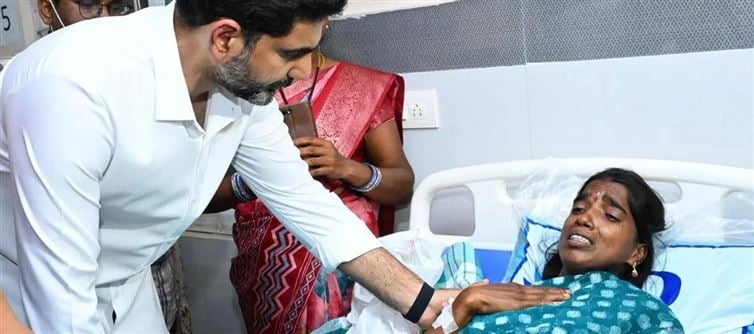
“Thalapathy Vijay Should Learn From Nara Lokesh: When Real Leaders Show Up and Pretenders Post Videos”
Empathy can’t be outsourced to a camera. Leadership isn’t a photo op — it’s presence in the fire.
A Nation in Mourning — and a Test of Leadership
Nine lives lost. Families shattered. Devotees crushed under the weight of panic at the Venkateswara Swamy temple in Kasibugga. It’s the third major stampede under the current andhra pradesh government — a pattern too grim to ignore.
At moments like this, grief turns into fury. people stop blaming fate and start looking for faces of accountability.
The Chandrababu Naidu Government, already reeling under scrutiny, stood at a dangerous crossroad — one wrong move could have sparked outrage beyond control.
And then came Nara Lokesh — calm, visible, and unflinching.
When Disaster Strikes, Leadership Is Measured in Minutes
Hours after the tragedy, lokesh was on the ground. No delay, no drama. He met the families, visited the injured, spoke to doctors, and faced the media head-on. He didn’t read from a teleprompter or issue a “statement of sorrow” from an air-conditioned office.
He listened. He apologized. He took questions — even uncomfortable ones.
That’s not spin; that’s leadership in real time.
Lokesh’s quick action didn’t erase the government’s failure — but it acknowledged it. And in today’s cynical political climate, that honesty is oxygen. When people are grieving, they don’t expect miracles — they just expect someone to show up.
Meanwhile, in tamil Nadu: A Missed Moment
Contrast that with Thalapathy Vijay, the tamil superstar who’s preparing to step into politics. When the Karur stampede took innocent lives at one of his events, all eyes turned to him — not just as a celebrity, but as a leader-in-waiting.
But instead of rising to the moment, Vijay retreated to Chennai. No visit. No presence. No raw emotion.
Days later, he released a condolence video — distant, polished, and painfully hollow. Only after more days did he meet families and victims — not in their homes or hospitals, but at a private resort, where cameras captured rehearsed empathy.
By then, the public had already decided: the man who dreams of leading tamil Nadu couldn’t even stand by his people when they were crying out for him.
Leadership Is Not About Silence — It’s About Standing in the Ashes
Nara Lokesh’s response was not perfect — it doesn’t absolve the state from systemic negligence.
Three stampedes in a short span point to administrative rot that demands accountability. But what lokesh did in that crucial window — to be present, to speak, to listen — showed that true leadership isn’t about escaping the storm, it’s about entering it.
Vijay’s carefully curated public image — the humble hero, the silent reformer — fell apart the moment real people needed more than symbolism.
Because empathy delayed is empathy denied.
The Difference Between Optics and Ownership
Lokesh owned the crisis — stepped into it, faced it, and didn’t hide behind advisors.
Vijay managed the optics — released content, not compassion.
Lokesh risked political heat — because showing up meant accountability.
Vijay played safe — because appearing vulnerable meant breaking character.
Politics isn’t about perfect timing. It’s about moral instinct — the gut reaction that tells a leader what matters most: image or people. lokesh, for all his political baggage, proved that instinct still exists. Vijay, for all his mass appeal, proved it doesn’t.
The Real Lesson: Presence Is Power
When a leader walks into tragedy, they don’t fix everything — but they give people a reason to hope again.
Lokesh did that. Vijay didn’t.
It’s not about one temple or one tragedy. It’s about a fundamental truth of leadership: when people die under your watch, you don’t issue a press release — you stand among them.
So yes, Thalapathy Vijay should learn from Nara Lokesh — not about politics, not about power, but about basic humanity.
⚡ Bottom Line:
Real leaders don’t send condolences.
They show up.
Even when the crowd is angry.
Even when the cameras aren’t rolling.
Because leadership isn’t about being loved.
It’s about being there — when it matters most.




 click and follow Indiaherald WhatsApp channel
click and follow Indiaherald WhatsApp channel